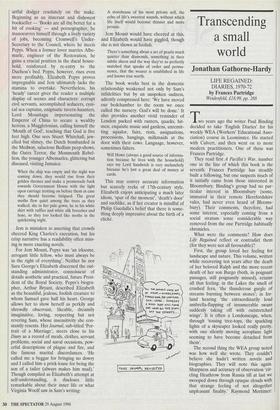In my lady's chamber
Peter Vansittart
The historical novel has notorious pit- falls: mock-period dialogue, contrived bawdiness, over-exotic decor, and indeed the extensive research guaranteed by Sara George's publishers. Extensive research sinks many promising novels, not least by self-indulgence in discoveries exciting but irrelevant. A novelist can prosper by not knowing too much, while suggesting much more. Ferdinand Mount wears his learning lightly and unromantically and, if his sub- title, 'A Revenger's Tale', carries associa- tions with Conan Doyle, Buchan, Masefield, his hero, Jem Mount, lacks all traces of derring-do. Jem, the narrator, a minor character in Pepys' Diary, is present- ed as a lifelong rival in quest for status, wealth, and indeed for Mrs Pepys. Their century was thrusting and ruthless, and, as author of The Theatre of Politics, Ferdinand Mount can expertly disentangle history from display, the real from propaganda, in a regime of ornate facades and mannered formalities shrewdly disguising vicious antagonisms. Streets seethed with political and religious hatred, erupting in the hyster- ical, McCarthy-like Popish Plot. This pro- vides ample opportunities for Jem, an artful dodger resolutely on the make. Beginning as an itinerant and dishonest bookseller — 'Books are all the better for a bit of cooking' — and pornographer, he manoeuvres himself through a lively variety of jobs, becoming Cromwell's Under- Secretary to the Council, where he meets Pepys. When a former lover marries Albe- marle, engineer of the Restoration, he gains a crucial position in the ducal house- hold, reinforced by re-entry to the Duchess's bed. Pepys, however, rises even more profitably, Elizabeth Pepys proves impregnable and Jem ultimately lacks the stamina to overtake. Nevertheless, his `heady' career gives the reader a multiple display of scenes and characters: corrupt civil servants, accomplished seducers, cyni- cal sea captains, enigmatic tavern-haunters, Lord Mountagu impersonating the Emperor of China to secure a wealthy heiress, a Muggletonian, calling himself the `Mouth of God', teaching that God is five feet high. One sees Stuart Whitehall, jew- elled but slimey, the Dutch bombarded in the Medway, salacious Bedlam peep-shows, the Oates Terror, the Monmouth Rebel- lion, the younger Albemarles, glittering but diseased, visiting Jamaica:
When the ship was empty and the night was coming down, they would rise from their golden thrones and make a promenade back towards Government House with the light open carriage trotting on before them in case they should become fatigued. The great moths flew quiet among the trees as they walked, she in her pale gown, he in his white shirt with ruffles and white silk breeches and hose, so they too looked like moths in the quickening night.
Jem is mistaken in asserting that crowds cheered King Charles's execution, but his crisp narrative has a readability often miss- ing in more exacting novels.
For Jem Mount, Pepys was 'an irksome, arrogant little fellow, who must always be in the right of everything'. Neither he nor Sara George's Elizabeth discerned the out- standing administrator, connoisseur of details aesthetic and practical, future Presi- dent of the Royal Society. Pepys's biogra- pher, Arthur Bryant, described Elizabeth as the beautiful, jealous, foolish creature to whom Samuel gave half his heart. George allows her to show herself as perkily and shrewdly observant, likeable, dreamily imaginative, loving, respecting but not revering Sam, whose insensitivity she con- stantly resents. Her Journal, sub-titled 'Por- trait of a Marriage', steers close to his Diary as a record of meals, clothes, servant problems, social and naval occasions, pow- erful descriptions of plague and fire, and the famous marital discordances. 'He called me a beggar for bringing no dowry and I called him a prick-louse for being the son of a tailor (always makes him mad).' Though compiled as Elizabeth's attempt at self-understanding, it discloses little remarkable about their inner life or what Virginia Woolf saw in Sam's writing:
A storehouse of his most private self, the echo of life's sweetest sounds, without which life itself would become thinner and more prosaic.
Jem Mount would have cheered at this, and Elizabeth would have giggled, though she is not shown as foolish.
There's something about a set of pearls much quieter than diamonds, something in their subtle sheen and the way they're so perfectly matched that speaks of order and perma- nence, that the wearer is established in life and knows true worth.
The book works best in the domestic relationship weakened not only by Sam's infidelities but by an unspoken sadness, adroitly compressed here: 'We have moved our bedchamber to the room we once called the nursery. God's will be done.' It also provides another vivid reminder of London packed with ranters, quacks, hit- men, exquisite music and gardens, unremit- ting squalor, fairs, riots, assignations, processions, hangings, milkmaids at the door with their cows. Language, however, sometimes falters.
Will Howe (always a good source of informa- tion because he lives with the household) says my Lord Sandwich is very melancholy because he's lost a great deal of money at cards.
This may convey accurate information but scarcely reeks of 17th-century style. Elizabeth enjoys anticipating a much later idiom, 'spur of the moment', 'death's door' and suchlike, as if her creator is mindful of Philip Guedalla's belief that there is some- thing deeply impressive about the birth of a cliché.



























































 Previous page
Previous page